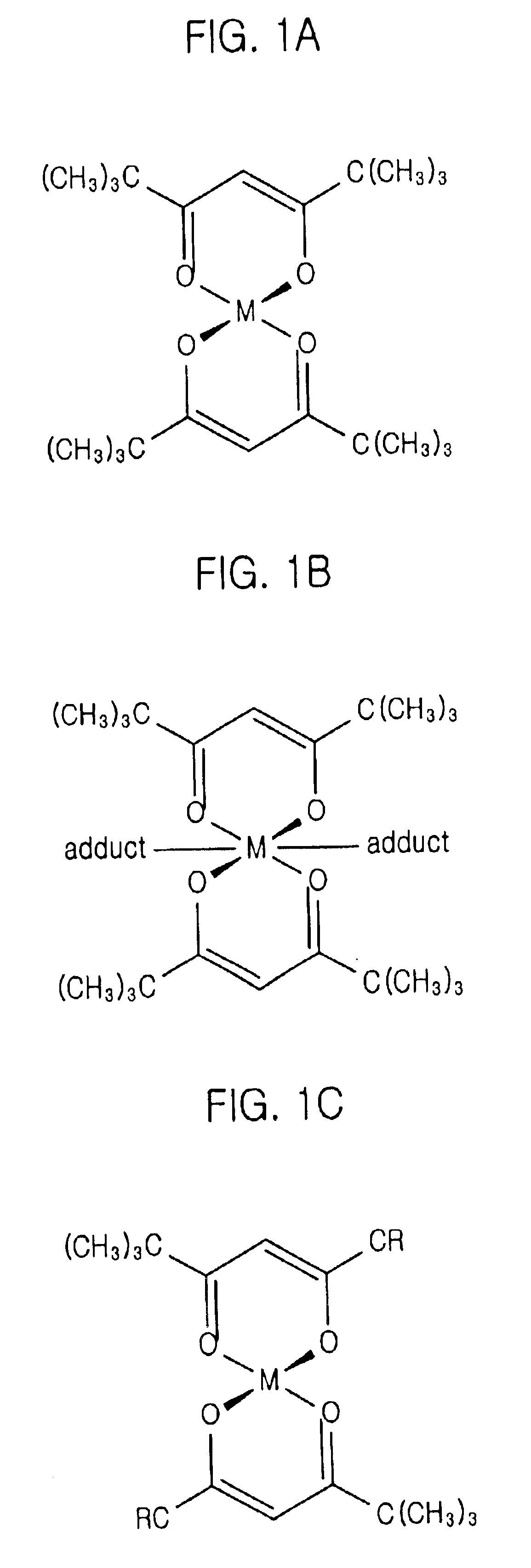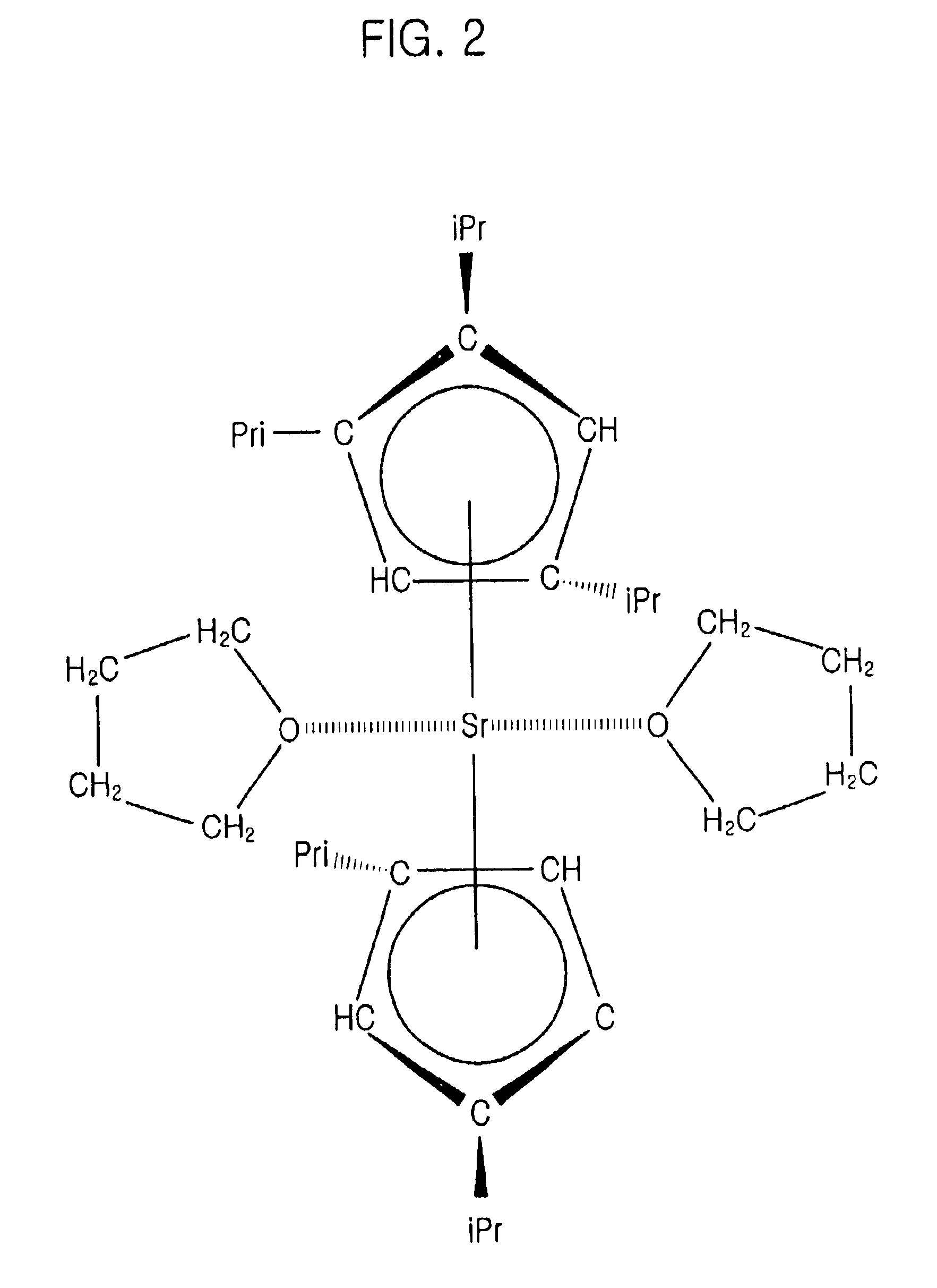Method for forming high dielectric layers using atomic layer deposition
a technology of atomic layer and high dielectric layer, which is applied in the direction of chemical vapor deposition coating, coating, plasma technique, etc., can solve the problems of inability to obtain reliable high dielectric layer, limited ability of sub>2 /sub>layer to acquire sufficient capacitance, and limited surface area of charge storage electrodes. achieve excellent reaction kinetics
- Summary
- Abstract
- Description
- Claims
- Application Information
AI Technical Summary
Benefits of technology
Problems solved by technology
Method used
Image
Examples
first embodiment
A first embodiment provides a method for forming a SrTiO3 (STO) layer with an atomic layer deposition (ALD) method using an NH3 gas.
Referring to the first embodiment, a substrate including a conductive layer for bottom electrode is loaded in a reactor equipping a pump for vacuum out, and then the substrate is heated to a predetermined temperature ranging from about 200° C. to about 400° C.
As a Sr source material, Sr(TMHD)2 is flowed into the reactor the reactor for predetermined time ranging from about 0.1 to about 10.0 seconds, and the Sr source material is adsorbed onto a surface of a substrate. At this time, a β-diketonate ligand or a cyclopenta ligand combined to a central Sr atom, may be used as the Sr source material. Also, a solution in which the β-diketonate ligand or the cyclopenta ligand combined to a central Sr atom is dissolved in a solvent, such as methanol, tertrahydrofuran (THE) and n-butylacetate, etc., is used as the Sr source material.
FIGS. 1A to 1C are structural ...
second embodiment
the present invention is to form STO layer with ALD method using plasma produced from mixed gas of H2 and O2 mixed gas.
Referring to the second embodiment, a substrate formed a conductive layer for bottom electrode is loaded within a reactor equipping a discharge pump, and then maintaining the substrate to a predetermined temperature ranging from about 100° C. to about 350° C.
As a Sr source material, Sr(TMHD)2 is flowed into the reactor about predetermined period ranging from about 0.1 to about 10.0 seconds to adsorb the Sr source material on a surface of a substrate. A β-diketonate ligand is combined with a Ba atom, which is a central metal, and the above-mentioned material may be used by dissolving in a solvent, such as methanol, THF and n-butyleacetate, etc.
To remove a non-react Sr source material, an inert gas, i.e., N2 and Ar, etc., are flowed into the reactor for a predetermined time ranging from about 0.1 to about 5.0 seconds or vacuum purged, and then the inert gas are discha...
third embodiment
the present invention is form a STO layer with ALD method using plasma, such as N2O, O2 and O3.
Referring to the first embodiment, a substrate formed a conductive layer for bottom electrode is loaded within a reactor equipping a discharge pump, and then maintaining the substrate to a predetermined temperature ranging from about 200° C. to about 400° C.
As a Sr source material, Sr(TMHD)2 is flowed into the reactor about predetermined period ranging from about 0.1 to about 10.0 seconds to adsorb the Sr source material on a surface of a substrate. A β-diketonate ligand uses materials combined with a Sr atom, which is a central metal, or a cyclopenta ligand combined with Sr atom, which is a central metal, may be used and the above-mentioned material may be used by dissolving in a solvent, such as methanol, THF and n-butyleacetate, etc.
To remove a non-react Sr source material, an inert gas, i.e., N2 and Ar, etc., are flowed into the reactor for a predetermined time ranging from about 0.1 t...
PUM
| Property | Measurement | Unit |
|---|---|---|
| temperature | aaaaa | aaaaa |
| temperature | aaaaa | aaaaa |
| temperature | aaaaa | aaaaa |
Abstract
Description
Claims
Application Information
 Login to View More
Login to View More - R&D
- Intellectual Property
- Life Sciences
- Materials
- Tech Scout
- Unparalleled Data Quality
- Higher Quality Content
- 60% Fewer Hallucinations
Browse by: Latest US Patents, China's latest patents, Technical Efficacy Thesaurus, Application Domain, Technology Topic, Popular Technical Reports.
© 2025 PatSnap. All rights reserved.Legal|Privacy policy|Modern Slavery Act Transparency Statement|Sitemap|About US| Contact US: help@patsnap.com


